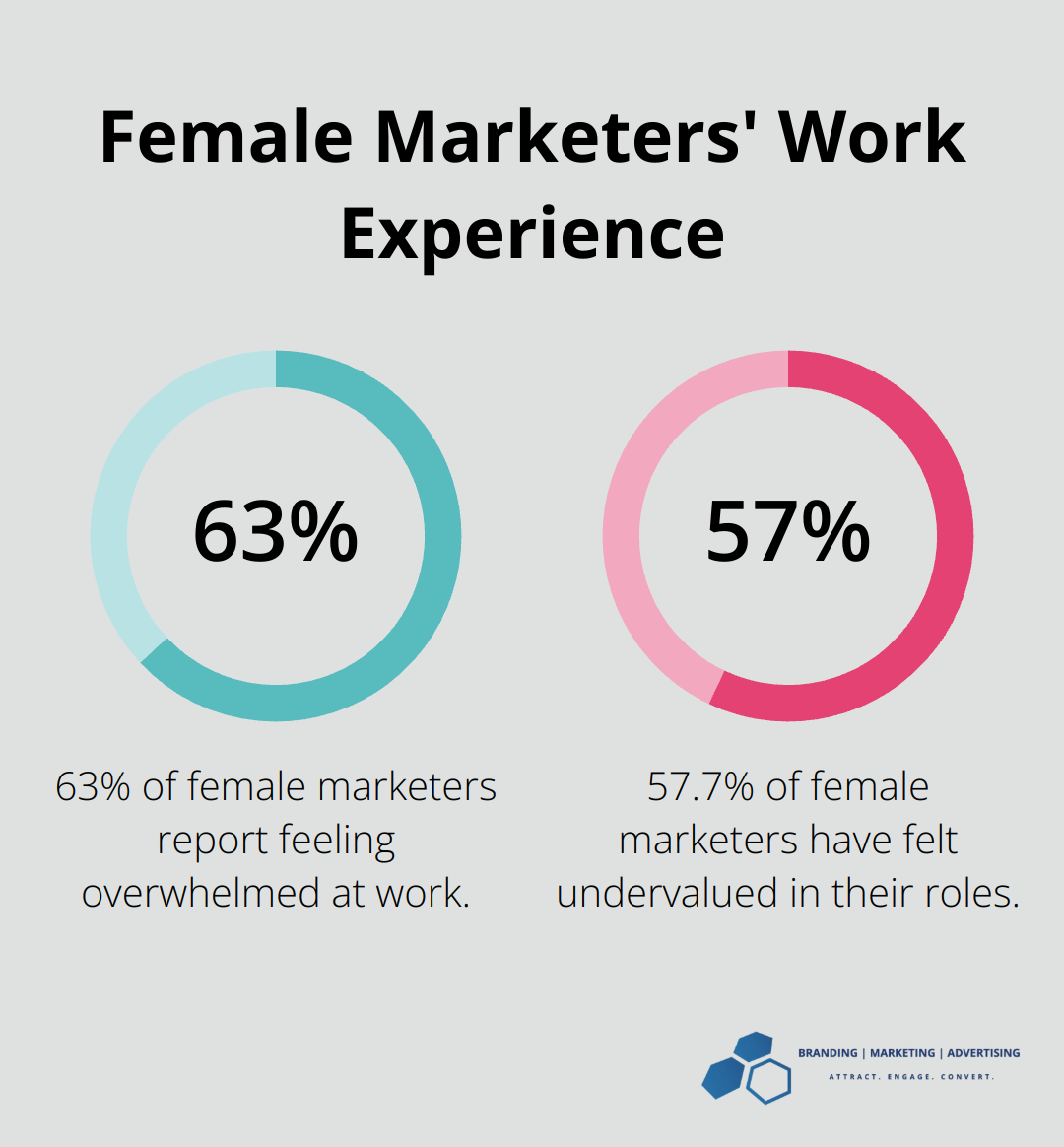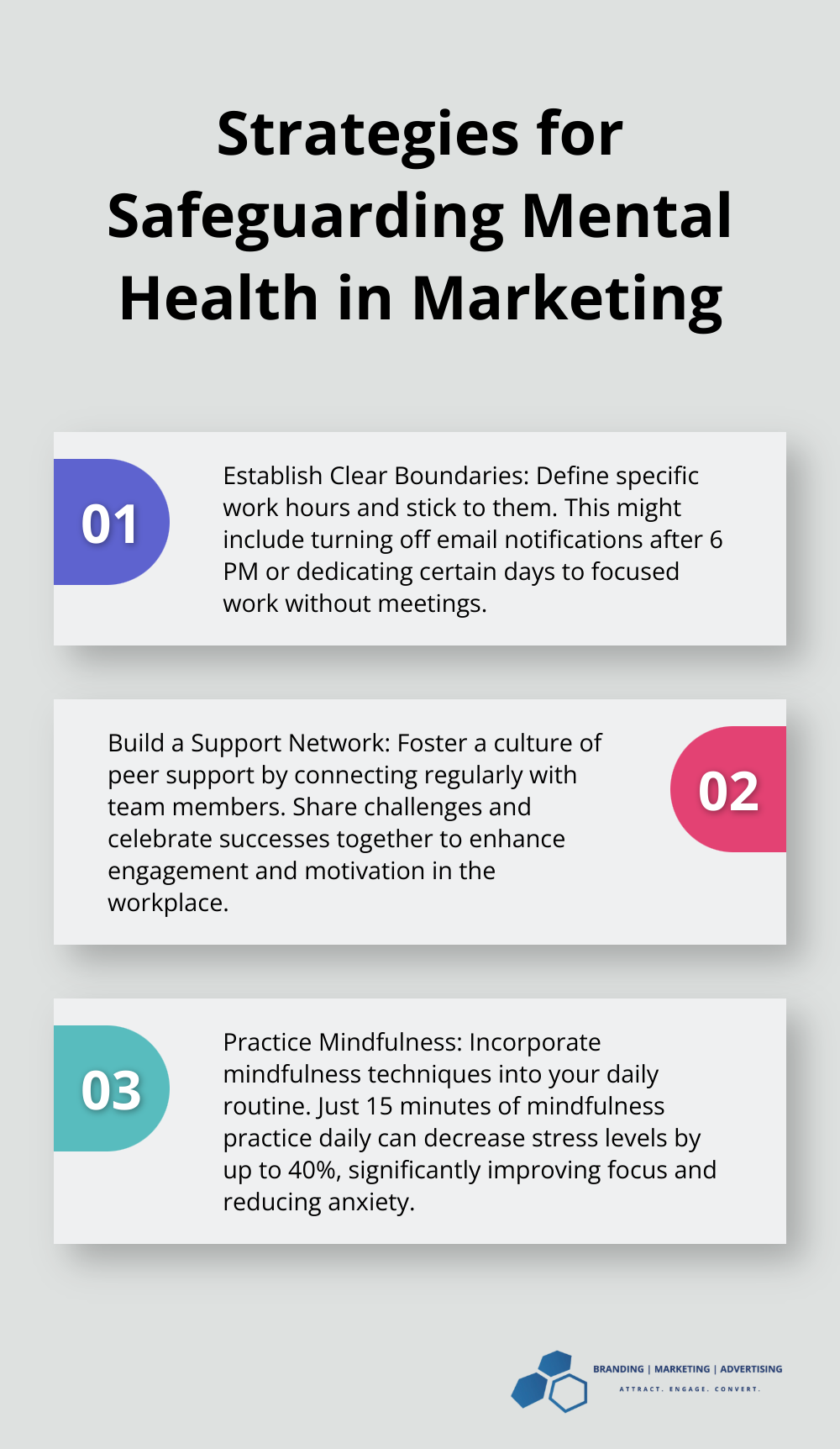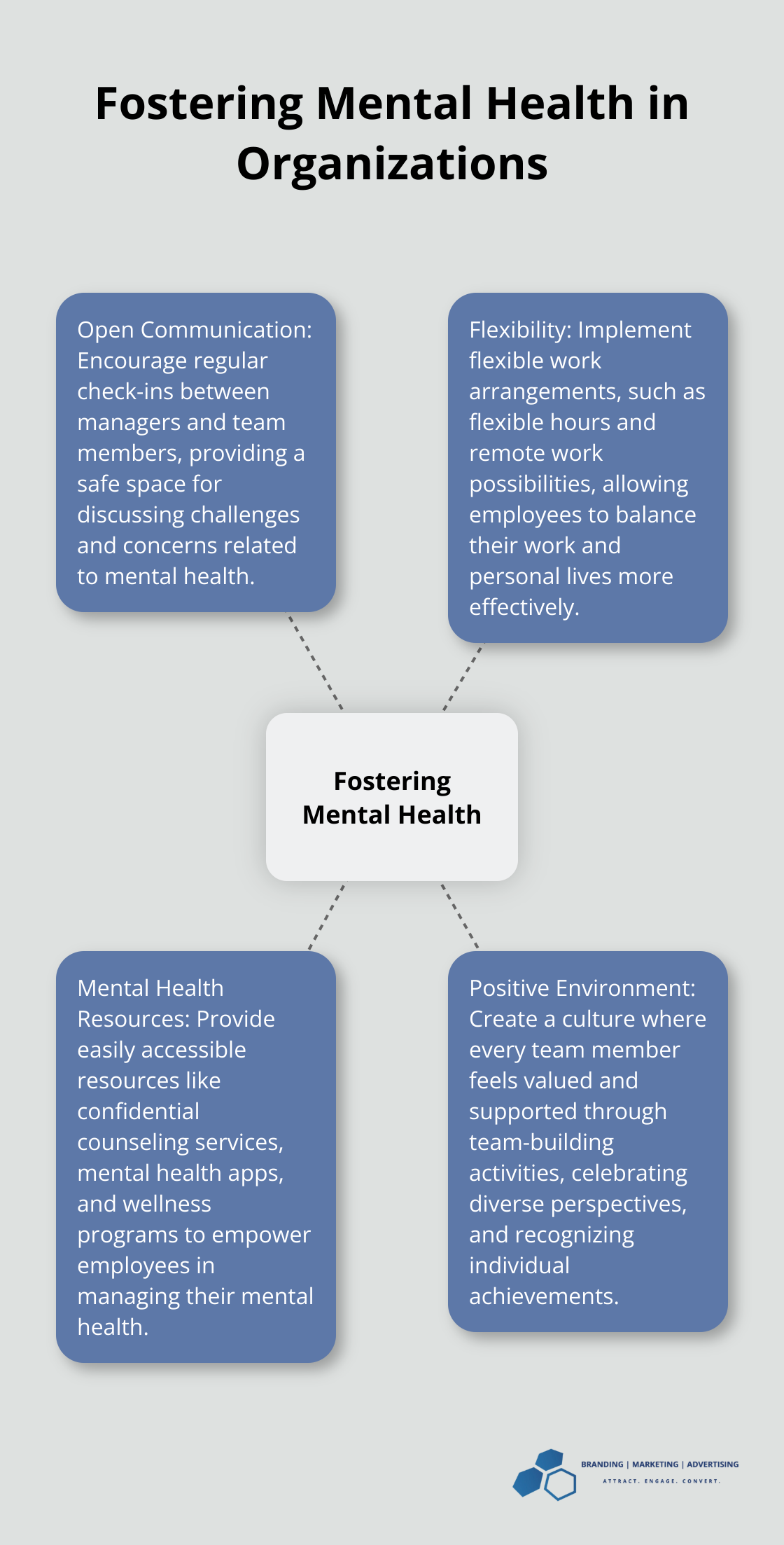How to Balance Mental Health in Marketing Careers?
At Branding | Marketing | Advertising, we understand the unique challenges marketers face in maintaining their mental well-being.
The fast-paced, high-pressure nature of marketing careers can take a toll on mental health, affecting both personal and professional lives.
In this post, we’ll explore the intersection of mental health and marketing, offering practical strategies to help you thrive in your career while prioritizing your psychological wellness.
Why Marketing Careers Can Strain Mental Health
Marketing careers often place significant pressure on mental well-being. At Branding | Marketing | Advertising, we recognize the unique challenges marketers face. This chapter explores the factors that contribute to stress in marketing roles.
The Deadline Pressure Cooker
Marketers frequently manage multiple projects with tight deadlines. Almost two-thirds (63%) of female marketers report feeling overwhelmed, while over half have felt undervalued (57.7%). This constant pressure to deliver quick results can trigger chronic stress and anxiety.

The 24/7 Connectivity Challenge
The digital age expects marketers to be available round the clock. Social media and customer inquiries never pause, blurring the lines between work and personal life. This constant connectivity makes it hard to disconnect and recharge effectively.
The Creative Drain Dilemma
Marketing demands a continuous flow of creative ideas. However, creativity isn’t a faucet one can turn on and off at will. The need to produce innovative campaigns consistently can lead to creative burnout. A survey revealed that 70% of professionals in the media, marketing and creative sectors have experienced burnout in the past 12 months.
The Imposter Syndrome Trap
Many marketers grapple with imposter syndrome (doubting their abilities despite evidence of competence). This self-doubt can intensify in marketing, where results are often public and measurable. A study in the Journal of Business and Psychology found that up to 82% of professionals experience imposter syndrome at some point in their careers.
The Metrics Pressure
Marketing roles often involve constant performance tracking. The pressure to meet and exceed key performance indicators (KPIs) can create additional stress. Marketers must balance creativity with data-driven decision-making, which can be mentally taxing.
To combat these challenges, it’s essential to implement strategies that protect your mental health. Regular breaks, setting boundaries, and practicing self-care are vital. Our team at Branding | Marketing | Advertising encourages prioritizing well-being alongside work commitments.
The fast-paced nature of marketing careers can take a toll on mental health, but with the right strategies, it’s possible to thrive. In the next section, we’ll explore specific techniques for maintaining mental well-being in the dynamic world of marketing.
How Marketers Can Safeguard Their Mental Health
Marketing professionals face unique mental health challenges in their fast-paced careers. We’ve developed strategies to help our team maintain mental well-being while excelling in their roles.
Establish Clear Boundaries
Setting boundaries is essential for maintaining work-life balance. Setting boundaries at work is an essential step to protect your well-being while boosting your job satisfaction and success. We encourage our team to define specific work hours and stick to them. This might mean turning off email notifications after 6 PM or dedicating certain days to focused work without meetings.
Build a Support Network
A strong support network is vital for mental health. Workplace friendships play an instrumental role in enhancing employee engagement, motivation, and overall workplace well-being. We foster a culture of peer support, encouraging team members to connect regularly, share challenges, and celebrate successes together.
Practice Mindfulness
Mindfulness techniques can significantly reduce stress and improve focus. A study in the Journal of Occupational Health Psychology found that just 15 minutes of mindfulness practice daily can decrease stress levels by up to 40%. We offer our team access to mindfulness apps and encourage short meditation breaks throughout the day.
Prioritize Physical Health
Regular exercise and healthy habits are fundamental to mental well-being. The Mayo Clinic reports that 30 minutes of moderate exercise three to five times a week can significantly improve mood and reduce anxiety. We provide our team with flexible schedules to accommodate regular exercise and promote healthy eating habits through office initiatives.
Embrace Continuous Learning
Continuous learning can boost confidence and reduce feelings of imposter syndrome. We encourage our team to attend industry conferences, take online courses, and participate in skill-sharing sessions. This not only enhances their professional skills but also provides a sense of growth and accomplishment.

Mental health is not just good for individuals-it’s essential for creating high-performing marketing teams. These strategies can help marketers better manage the unique stressors of their roles. However, creating a supportive work culture is equally important. Let’s explore how organizations can foster an environment that prioritizes mental well-being.
How Organizations Can Foster Mental Health
At Branding | Marketing | Advertising, we believe that creating a supportive work culture is essential for maintaining mental health in marketing careers. Organizations play a vital role in fostering an environment where employees can thrive both professionally and personally.
Open Communication Promotes Well-being
Encouraging open dialogue about mental health is the first step towards creating a supportive workplace. A recent survey by Mind Share Partners and Harris Poll found that 1065 full-time employed adults were surveyed on timely topics around workplace mental health in April 2024. We promote regular check-ins between managers and team members, providing a safe space for discussing challenges and concerns.
Flexibility Enhances Work-Life Balance
Implementing flexible work arrangements can significantly improve employee mental health. We offer flexible hours and remote work possibilities, allowing our team to balance their work and personal lives more effectively.
Mental Health Resources Empower Employees
Providing easily accessible mental health resources is important. We offer our employees access to confidential counseling services, mental health apps, and wellness programs. These resources empower our team to proactively manage their mental health.
Positive Environment Boosts Morale
Creating a culture where every team member feels valued and supported goes beyond just offering resources. We organize team-building activities, celebrate diverse perspectives, and recognize individual achievements regularly. This approach has led to increased job satisfaction and reduced stress levels among our staff.

Organizations that prioritize mental health see tangible benefits. A recent article in Forbes cites the World Economic Forum suggesting that for every dollar invested in mental health interventions, there is a return of $4 in improved health and productivity. Implementing these strategies can create a work environment that supports mental well-being, leading to increased productivity, creativity, and overall success in marketing careers.
Final Thoughts
The relationship between mental health and marketing careers requires attention and action. Marketers face unique challenges that can impact their psychological well-being, but strategies exist to navigate these pressures effectively. Organizations must foster environments that support mental health through open communication, flexibility, and accessible resources.
We at Branding | Marketing | Advertising encourage all marketing professionals to take proactive steps towards better mental health. Implementing one or two strategies from this post can lead to a comprehensive approach to mental well-being. Investing in mental health is an investment in your career and overall quality of life (and it’s never too late to start).
The intersection of mental health and marketing is an ongoing journey. Marketers who prioritize psychological wellness alongside professional growth will thrive in their careers while maintaining a healthy work-life balance. Let’s commit to making mental health a cornerstone of our marketing careers, fostering a more resilient, creative, and successful industry for all.












